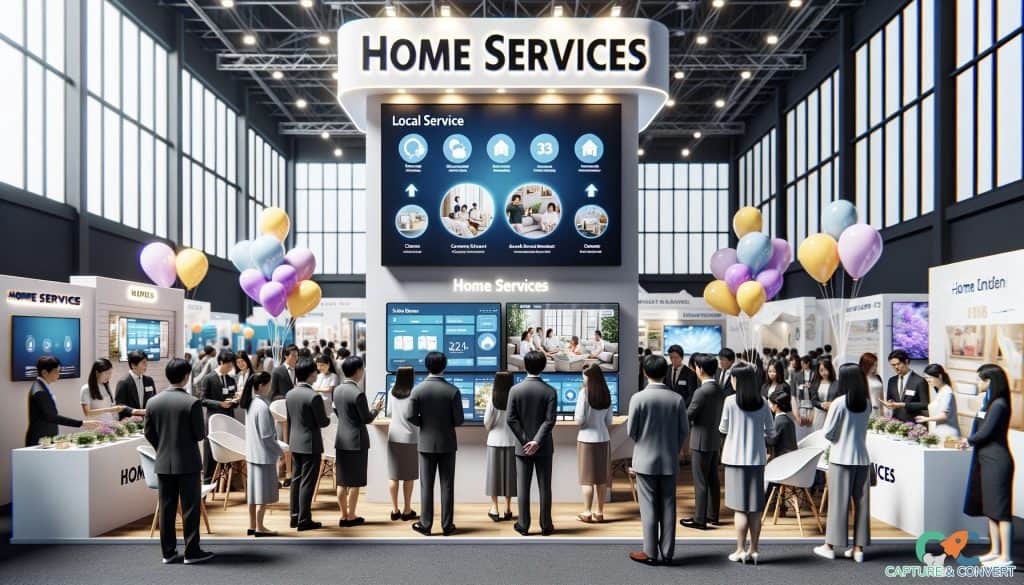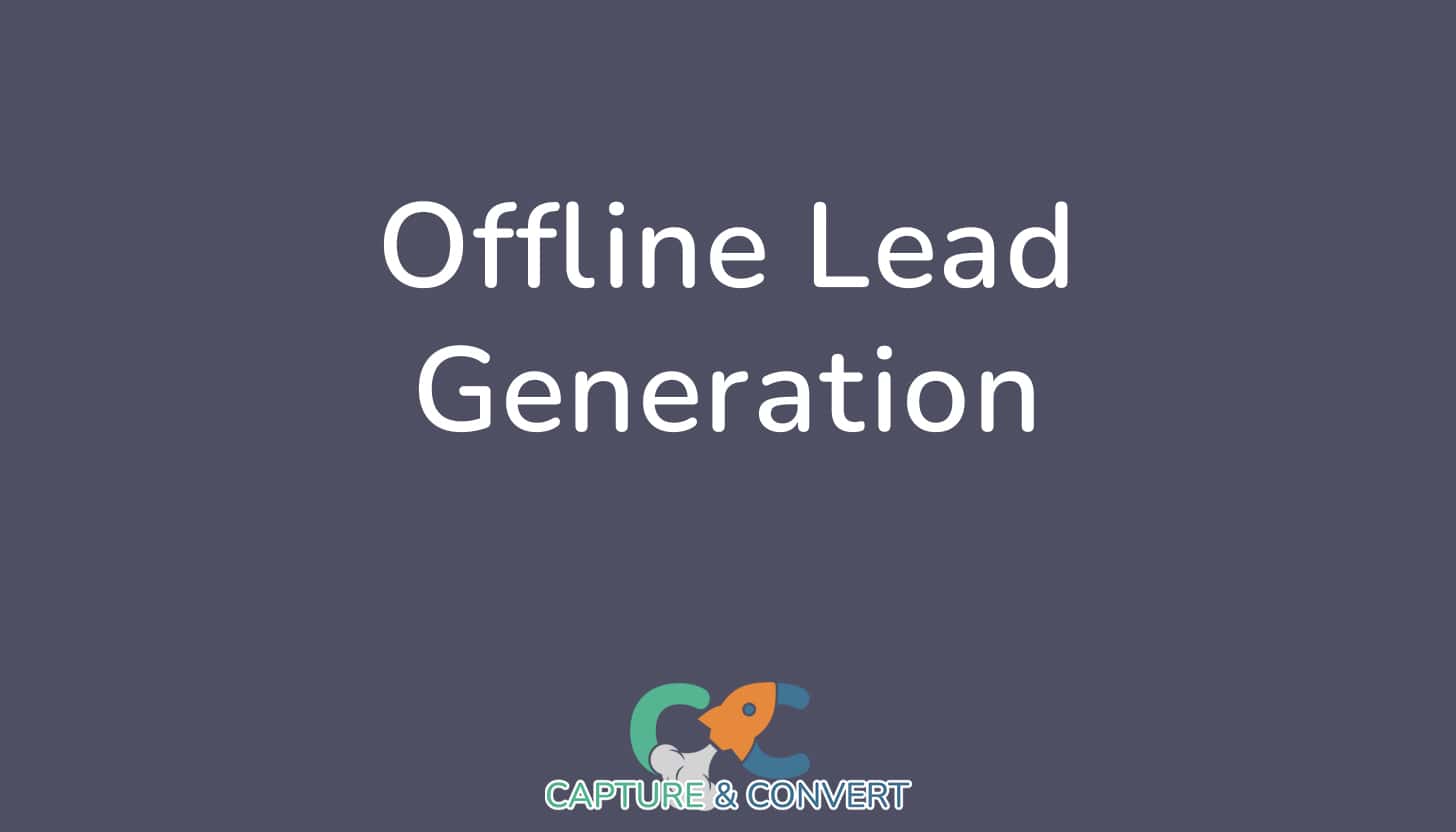Explore 8 dynamic offline strategies to boost your local lead generation. From local events to media leverage, harness the power of community engagement.
Offline local events, like community gatherings and workshops, play a vital role for local lead generation.
In the digital age, these face-to-face interactions provide a unique opportunity for businesses to connect with their immediate community.
While online marketing is crucial, the power of local engagements lies in their ability to create genuine, long-lasting connections with potential customers.
Offline events cut through the digital noise, making them essential to augment online efforts.
Community engagement has been found to be a precursor of brand engagement, this has been researched by Laurence Dessart and published in the Journal of Marketing Management on March 27th 2017.
In this article, we explore eight impactful offline strategies for driving local business growth through lead generation.
Contents
- Suitability of Local Events and Sponsorships for Various Business Types
- Importance of Local Events in Lead Generation
- 1. Host Beneficial Local Events
- 2. Attend Key Local Trade Shows
- 3. Conduct Successful Workshops
- 4. Engage in Effective Local Sponsorships
- 5. Set Up Community Event Booths
- 6. Secure Guest Speaking Opportunities
- 7. Leverage Local Media
- 8. Refine with Event Feedback
- Local Events' Influence on Brand Reputation
- Impact of Event Location on Success
- Identifying Peak Seasons for Local Events
- Cost Considerations for Hosting Local Events
- Handling Negative Feedback from Local Events
- Integrating Local Events with Digital Marketing
- ROI Comparison Between Local Events and Digital Marketing
Suitability of Local Events and Sponsorships for Various Business Types

The versatility of local events and sponsorships in driving business growth extends across various industries and business models.
While these strategies are generally effective, their impact can vary depending on the nature of the business.
For instance, local events and sponsorships tend to be particularly advantageous for businesses with a strong local presence, such as restaurants, retail stores, and service providers.
However, even businesses with a primarily online presence can benefit from participating in local events to enhance their community engagement and build trust.
The key lies in tailoring these strategies to align with specific industry needs and customer demographics, thereby optimizing their potential for lead generation.
Importance of Local Events in Lead Generation
Local events hold significant importance for lead generation due to their ability to create real and meaningful connections with potential customers.
These events provide a unique platform for businesses to engage directly with their local audience, fostering trust and brand loyalty.
Additionally, local events enable businesses to gather valuable leads and insights that can be instrumental in driving long-term growth.
Benefits

Offline strategies for local lead generation brings many benefits to medium sized businesses.
The following list describes 4 benefits businesses can expect when implementing an offline strategy.
- Personalized Engagement: Local events allow businesses to interact directly with their community, providing a personalized touch that can't be replicated online.
- Trust Building: Face-to-face interactions at local events foster trust and credibility, making it more likely for potential customers to convert into loyal clients.
- Lead Generation: These events offer opportunities to collect contact information, generating leads for future marketing efforts.
- Community Involvement: Participation in local events demonstrates a commitment to the community, enhancing a brand's reputation.
Drawbacks
Despite the many benefits of offline strategies, there are some disadvantages to be aware of.
The following list explains 3 drawbacks that businesses can encounter when implementing an offline strategy.
- Resource Intensive: Planning and executing local events can be resource-intensive in terms of time, money, and manpower.
- Limited Reach: Local events primarily target a specific geographical area, limiting their reach compared to online strategies.
- Measuring ROI: It can be challenging to precisely measure the return on investment for local events, making it important to track leads and conversions diligently.
While local events require significant resources, the benefits often outweigh these drawbacks for local businesses.
Listed below are 8 powerful offline strategies for local lead generation.
- Host Beneficial Local Events
- Attend Key Local Trade Shows
- Conduct Successful Workshops
- Engage in Effective Local Sponsorships
- Set Up Community Event Booths
- Secure Guest Speaking Opportunities
- Leverage Local Media
- Refine with Event Feedback
1. Host Beneficial Local Events

Hosting beneficial local events is a pivotal strategy for businesses looking to drive local lead generation.
These hosted events have the power to engage the local audience, increase brand awareness, create direct lead generation opportunities, and strengthen relationships within the community.
The following list will provide 10 benefits of hosting local events and how to do it step by step.
- Boost Audience Engagement: By creating interactive and informative events, businesses can capture the attention of their local audience, fostering active engagement.
- Amplify Brand Awareness: Local events provide a platform to showcase your brand's values and offerings, increasing local brand recognition.
- Generate Direct Leads: These events allow for collecting contact information from attendees, offering a pool of potential leads for future marketing efforts.
- Strengthen Community Ties: Hosting local events demonstrates a commitment to the community, forging deeper connections with local residents.
- Define Clear Objectives: Determine the specific goals you want to achieve with your event, whether it's lead generation, brand promotion, or community outreach.
- Choose the Right Event Type: Select an event format that resonates with your target audience and aligns with your business values.
- Promote Effectively: Use a variety of marketing channels to spread the word about your event, including social media, local press, and community outreach.
- Offer Value: Ensure your event provides valuable content, experiences, or incentives to attract and engage attendees.
- Collect Data: Implement efficient lead capture methods to gather attendee information and build your lead database.
- Follow Up: After the event, nurture the leads you've acquired with tailored follow-up communication and offers.
2. Attend Key Local Trade Shows

Having a presence at local trade shows is a crucial component of a local lead generation strategy.
It offers the opportunity for direct interaction with prospective leads, allows businesses to demonstrate their products or services, and provides a platform for real-time feedback.
In this section, we'll explore the significance of attending local trade shows and how it can contribute to your lead generation efforts.
The following list shows 8 benefits why participating in local trade shows can help in generating leads and how to make the best out of those events..
- Facilitate Direct Interaction: Trade shows bring potential leads and businesses together in one place, allowing for face-to-face conversations and relationship-building.
- Showcase Products and Services: Businesses can use trade shows to display their offerings, enabling attendees to see, touch, and experience the products or services firsthand.
- Gather Real-Time Feedback: Interactions at trade shows provide valuable insights into customer preferences, pain points, and feedback, which can inform future marketing efforts.
- Research Relevant Trade Shows: Identify trade shows that align with your industry and target audience.
- Prepare a Captivating Booth: Design an eye-catching and informative booth that effectively showcases your products or services.
- Train Your Team: Ensure your team is well-prepared to engage with attendees, answer questions, and collect leads.
- Promote Your Presence: Use your marketing channels to let your audience know you'll be at the trade show, encouraging them to visit your booth.
- Collect Leads Proactively: Implement lead capture methods at the event, such as contests, surveys, or contact forms.
- Follow Up After the Event: Reach out to the leads you've gathered, offering additional information and incentives to move them down the sales funnel.
3. Conduct Successful Workshops

Hosting successful workshops is an effective strategy for local lead generation.
These workshops offer valuable hands-on training and direct interactions with attendees, creating a conducive environment for generating leads.
In this section, we'll delve into the planning, execution, and follow-up stages of conducting workshops and highlight their importance in lead generation.
The following list highlights 12 tips of conducting successful workshops.
- Provide Hands-On Training: Workshops offer attendees the opportunity to learn and apply new skills, fostering trust and showcasing your expertise.
- Facilitate Direct Interactions: In a workshop setting, businesses can engage with participants in real-time, answering questions, addressing concerns, and building relationships.
- Generate Targeted Leads: Workshop attendees are often genuinely interested in the topic, making them prime candidates for lead generation.
- Define Workshop Goals: Clearly articulate the objectives and what you want attendees to gain from the workshop.
- Select a Relevant Topic: Choose a topic that aligns with your expertise and is of interest to your target audience.
- Promote the Workshop: Use various marketing channels to promote the workshop and encourage sign-ups.
- Prepare Engaging Content: Develop informative and engaging content for the workshop, ensuring it provides value to attendees.
- Engage with Participants: During the workshop, actively interact with attendees, answer questions, and collect contact information.
- Follow Up After the Workshop: Reach out to workshop participants with additional resources, offers, or opportunities to continue the relationship.
4. Engage in Effective Local Sponsorships

Engaging in local sponsorships is a strategic way to enhance a business's community presence.
Sponsoring local events or teams can provide targeted exposure and increase trustworthiness among the local audience.
The following list highlights 8 benefits of local sponsorships and provides actionable steps to effectively engage in local sponsorships.
- Enhance Community Presence: Sponsorships demonstrate your commitment to the local community, fostering a positive reputation.
- Provide Targeted Exposure: Sponsorship opportunities often align with your target audience, ensuring your brand is seen by the right people.
- Build Trust: Supporting local events or teams can create a sense of trust and credibility in the eyes of local consumers.
- Identify Local Opportunities: Research local events, teams, or initiatives that align with your business values and target audience.
- Set Clear Objectives: Define your sponsorship goals, whether it's increased brand visibility, lead generation, or community engagement.
- Negotiate Terms: Work out the terms of the sponsorship agreement, including the scope of your involvement and benefits received.
- Leverage Your Sponsorship: Promote your sponsorship actively through marketing channels and at the sponsored events.
- Track and Measure Impact: Use data and metrics to evaluate the effectiveness of your sponsorship and its impact on lead generation.
5. Set Up Community Event Booths

Setting up community event booths is a dynamic strategy for local lead generation.
A well-designed booth can grab the attention of event-goers, drawing them in for interaction.
Effective booth setup can attract event attendees, offering engaging demonstrations, like captivating displays and interactive showcases, to showcase your products or services.
Additionally, providing incentives, such as discounts, giveaways, or exclusive offers, can motivate attendees to become leads.
The following list outlines 6 steps for setting up community event booths effectively.
- Plan Booth Layout: Design an inviting and organized booth layout that encourages visitors to explore.
- Create Engaging Displays: Use visuals, interactive elements, and demonstrations to pique attendees' interest.
- Train Booth Staff: Ensure your booth staff is knowledgeable, friendly, and prepared to engage with event attendees.
- Offer Incentives: Provide incentives, like discounts or promotional items, to encourage attendees to share their contact information.
- Capture Lead Information: Implement lead capture methods, such as contact forms or digital sign-ups, to collect attendee information.
- Follow Up Promptly: After the event, follow up with leads, providing additional information or offers to nurture the relationship.
6. Secure Guest Speaking Opportunities

In the realm of local lead generation, securing guest speaking opportunities stands out as a powerful strategy.
By positioning yourself as an industry expert through speaking engagements, you not only establish credibility but also gain exposure to new audiences interested in your field.
These opportunities offer more than just a platform to share knowledge; they enable direct lead collection, providing a chance to connect with potential clients personally.
The following list outlines 6 steps to secure guest speaking opportunities effectively.
- Identify Relevant Events: Research local events, conferences, and organizations in your industry where you can offer valuable insights.
- Craft a Strong Pitch: Develop a compelling pitch highlighting your expertise and the value you can bring to the event.
- Network and Build Relationships: Attend industry gatherings, connect with event organizers, and build relationships to increase your chances of securing speaking opportunities.
- Submit Proposals: Submit well-crafted proposals to event organizers, outlining your proposed topic and its relevance to their audience.
- Prepare Engaging Content: Create a captivating presentation or speech that resonates with your target audience.
- Collect Leads: During your speaking engagement, offer opportunities for attendees to provide their contact information or engage in post-event discussions.
7. Leverage Local Media

Harnessing the power of local media outlets stands as a cornerstone strategy for lead generation.
These outlets, ranging from newspapers to television to radio, offer businesses a direct channel to the heart of the community.
Targeting the local audience, local media not only disseminates your message but also builds an essential bridge of trust within the community, fostering credibility and reliability.
Moreover, this localized approach generates invaluable local leads, as your presence in these media outlets naturally attracts individuals genuinely interested in the services or products you offer.
The following list shows 5 tips on how to use of local media for local lead generation properly.
- Identify Suitable Outlets: Research and identify the most relevant local media outlets that cater to your target audience.
- Develop Newsworthy Stories: Create compelling stories, news releases, or press materials that are relevant to the local community.
- Establish Media Relationships: Build relationships with local journalists, editors, and producers to increase the likelihood of media coverage.
- Pitch Your Story: Craft persuasive pitches and submit them to local media outlets, highlighting the local relevance and human interest aspects of your story.
- Monitor and Engage: Keep track of your media coverage and engage with the local audience through social media or your website to capture leads.
8. Refine with Event Feedback

Post-event feedback is a crucial step in the lead generation process, as it provides valuable insights that can shape future strategies.
By actively seeking and analyzing feedback, businesses can identify what worked and what didn't, enabling them to make data-driven improvements.
This feedback-driven approach not only enhances the effectiveness of lead generation efforts but also strengthens the bond between the business and its local audience.
The following list shows 3 steps to use event feedback to generate leads.
- Collect Feedback: Gather feedback through surveys, online forms, or direct interactions with event attendees.
- Analyze Responses: Analyze the feedback data to identify patterns, common themes, and areas for improvement.
- Integrate Findings: Use the insights from the feedback to refine event planning, execution, and lead generation strategies for future events.
Local Events' Influence on Brand Reputation
Local events play a pivotal role in shaping brand reputation by providing businesses with a platform to engage directly with the community.
Through active participation and genuine interactions, businesses can establish a positive image, demonstrating their commitment to local concerns and values.
By fostering trust and credibility within the community, local events contribute significantly to enhancing brand perception and reputation.
Impact of Event Location on Success

The event location is a critical factor in determining the success of local events.
The choice of venue and its location can directly impact attendance, accessibility, and the overall experience for attendees.
A strategically selected location can enhance the event's appeal, ensure a higher turnout, and contribute to its overall success by providing convenience and a pleasant atmosphere for participants.
Hosting Eco-Friendly Local Events
Businesses can ensure that their local events are environmentally friendly by prioritizing sustainability as a core value.
This involves minimizing waste, reducing energy consumption, and choosing eco-friendly options for materials and supplies.
General steps include using recyclable or biodegradable materials, encouraging carpooling or public transportation for attendees, and implementing waste reduction and recycling programs during the event.
Identifying Peak Seasons for Local Events
Peak seasons for local events often coincide with favorable weather conditions and holiday seasons, making spring and summer popular times for outdoor events.
Additionally, the fall season, particularly around back-to-school and harvest festivals, can also see a surge in local events.
Holiday periods, such as December for winter-themed events, can be especially effective in certain regions.
However, the popularity and effectiveness of local events may vary depending on factors like location, cultural traditions, and community preferences.

Ideal Duration
The ideal duration for a local workshop or trade show can vary depending on the goals, content, and audience.
Workshops typically range from a few hours to a full day, allowing for in-depth learning.
Trade shows often span multiple days to accommodate various exhibitors and attendees.
Factors influencing the ideal duration include the complexity of the subject matter, attendee availability, and the logistical needs of the event.
Cost Considerations for Hosting Local Events
The costs associated with hosting a local event can vary widely depending on the scale and nature of the event.
Small community gatherings or workshops may have relatively low costs, ranging from a few hundred to a couple of thousand dollars for venue rental, materials, and promotion.
Larger events, such as trade shows or festivals, can incur much higher expenses, ranging from several thousand to tens of thousands or even more, covering expenses like venue rental, marketing, staff, logistics, and entertainment.
Handling Negative Feedback from Local Events

Businesses can effectively manage negative feedback from local events by actively listening to the concerns raised, acknowledging them, and responding promptly with empathy.
It's crucial to address issues openly, offering solutions or remedies when possible.
Additionally, learning from negative feedback is essential for continuous improvement; analyzing criticism can lead to positive changes and enhanced future events, ultimately strengthening the relationship between the business and the local community.
Integrating Local Events with Digital Marketing
Local events can be seamlessly integrated with digital marketing strategies to amplify their impact.
Businesses can leverage online platforms to promote and drive attendance for local events, using social media, email marketing, and online ticketing.
Furthermore, businesses can continue engagement post-event through digital channels, such as sharing event highlights, testimonials, or behind-the-scenes content, effectively extending the event's reach and building long-lasting connections with the local audience.
ROI Comparison Between Local Events and Digital Marketing
Local events and digital marketing offer different avenues for generating ROI.
While digital marketing often provides a broader reach and more immediate data for tracking and analyzing results, local events can excel in building stronger, more personal connections with the local audience and fostering trust.
The effectiveness of each method depends on factors like the business's goals, target audience, and the specific industry, making a blend of both strategies a powerful approach for maximizing ROI.

